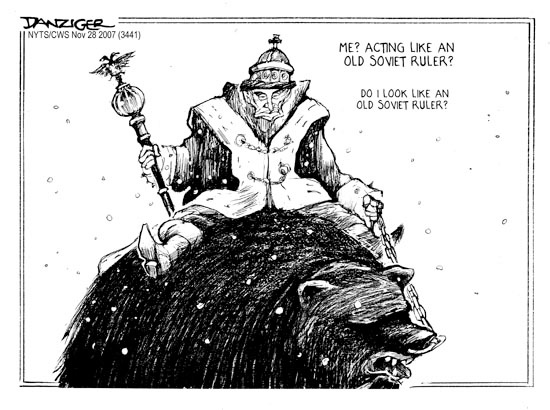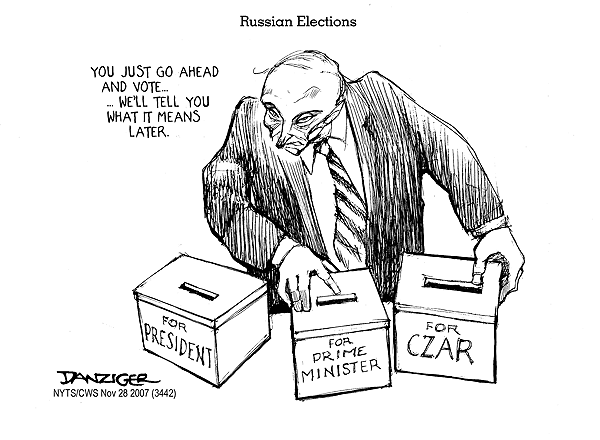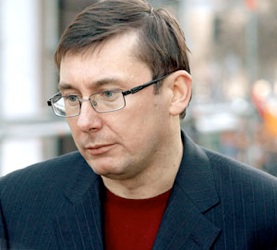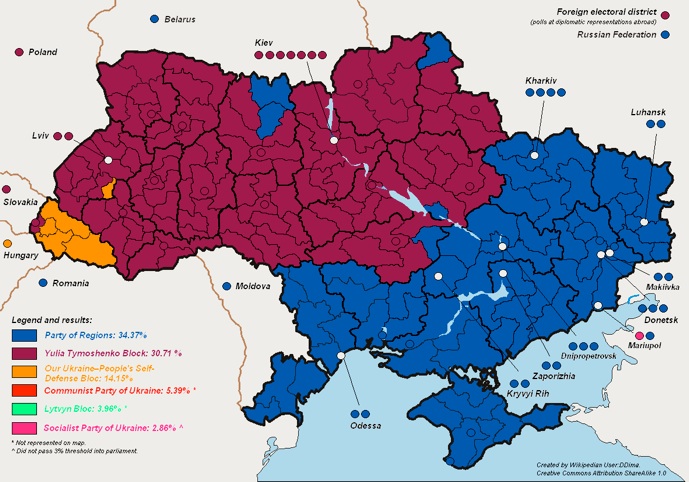2007

A constant throughout my visit to Ukraine were the parliamentary elections. Unlike neighboring Russia, which has regressed to its historical norm of monarchial rule1, Ukraine has a vibrant and flourishing democracy. The presidential election of 2004 was the crucible in which it was forged – the old guard2 tried to fix an election, and the people said "No!" Since then, the elections have been real and have been vigorously fought.
Ukraine is a multi-party democracy with a parliamentary system. The president, Viktor Yushchenko, is the head of Our Ukraine. His main opponent, Viktor Yanukovich, was Prime Minister and head of the Party of Regions (PoR), which had a tenuous ruling coalition3 in the Verhovna Rada (parliament). Little was getting done in the Rada, and the PoR was getting deputies (members of parliament) to switch affiliation4 by bribery and threats (the PoR has strong ties to the Donetsk mafia), so Yushchenko dissolved parliament.
The campaign was on. The main parties all had their own colors5, there were ads everywhere, and small campaign kiosks appeared, with volunteers passing out posters, brochures, and campaign gear6. The talk everywhere was about the elections, in the newspapers, on the radio, on the television, and in general conversation. There were political debates on all the channels, polling data was discussed, and ads ran constantly. There were few concerns about he legitimacy of the election, everyone assumed it would be free and fair7.
My kumy in both L'viv and Kyiv were political junkies, so I was kept up to date on all the happenings, and got to watch a lot of the television coverage8. I got to know all the major players by sight, and found that I liked Yulia Tymoshenko (of the eponymous bloc), as well as Yuriy Lutsenko9, the head of the Our Ukraine coalition. These two blocs had announced well in advance that they would caucus together in the new parliament, so that a vote for either one would be a vote for both (giving people who were unhappy with Yushchenko a way to express their displeasure without voting for Yanukovych). We followed the polls closely, were on pins and needles, and then stayed up late September 30th10 watching the election results come in.
The results were better than we'd expected, although it was a while before they were final. 99.9% of the vote was counted within the first 24 hours. The remaining 0.01% took some four more days to count, due to irregularities in a few "blue" regions. Simferopil, in Crimea, just couldn't get its act together and count the votes, for some mysterious and unexplained reasons11. In the end, although the PoR got the most votes overall, the two Orange blocs together outpolled them. There were a lot of smaller parties, but only two made the 3% cut-off: the Lytvyn bloc12, and the Communists13. The Socialists didn't make the cut, to the great jubilation of everyone they'd sold out the last time around14. And our side had gotten enough votes for an outright majority – they didn't need to make deals with the minor parties to form a ruling coalition. It was a pure victory, and we celebrated for days. We looked forward to Yulia becoming Prime Minister, knowing she, a populist, would soon shake things up. (As it turned out, she didn't take over until January of 2008, due to all sorts of shenanigans and back room goings on. Plus ça change, moins ça change.)
Main UKRAINE Page
___________
-
1.Vladimir Putin, the current Russian president, is often referred to as a tsar. He came up through the KGB, was appointed Yeltsin's vice president, and then Yeltsin conveniently resigned. (One wonders what dirt the KGB had on Yeltsin.)

Putin decided to restart a war in Chechnya to prove himself as a capable, vigorous, leader, unlike the old, alcoholic Yeltsin, and handily won the next election. And the one since.
The war quickly went south, devolving into a morass not unlike that in Iraq. But oil prices went up, and Russia, being a major producer of oil, cashed in. Putin found ways to re-nationalize the oil companies, by jailing and expropriating the oligarchs who opposed him politically. This wealth, which was shared just enough with the commoners to keep them quiet and complacent, mostly found its way into the coffers of Putin's own circle (he is reputed to be worth some forty BILLION dollars himself.)
Putin has kept control by destroying the free press – most television and newspapers have been re-nationalized, and those that haven;t have learned to self-censor. Many journalists and dissidents have been killed. Terror – and the fear of it – is also a potent weapon in his hands. Every disaster is blamed on terrorists, and people grow more afraid and more reliant on the government to keep them safe.
Putin has centralized power–governors are no longer elected, but appointed. There is little opposition in the Duma, and his acts are rubber-stamped. He controls everything. He can not run for another term, but has chosen a successor. (Anyone who dares run against his man is jailed, forced off the ballot, or both.) He brooks no dissent. And he will stay around, maintaining control of the government: Putin has agreed to head a new political party (which is also suddenly the majority party) and will run for the Duma and become Prime Minister.
And the Russian people seen happy with this. Some small number dissent, at great risk, but most acquiesce. They have chosen security over liberty.

-
2.Ukraine had been ruled, since independence, by regimes which merely continued Soviet rule with an overlay of nationalism. When the USSR broke up, all the former communist cadres suddenly became democrats, and continued their oligarchical rule of the country. Under Kuchma, the second president, the government had become increasingly repressive: there were restrictions on press freedom, a journalist critical of the government was murdered, corruption grew increasingly worse, and there was a push for closer ties with Russia and the CIS. Although commerce was allowed to flourish, the benefits accrued to a few, many of whom had gotten quite rich as a result of questionable privatization.
-
3.The Orange (pro-Western) coalition had initially had a small majority after the 2006 elections, and Yulia Tymoshenko had become a very popular prime minister. Then Moroz (right), head of the Socialist party, sold out and took his deputies over to the Party of regions bloc (pro-Russian), giving them a small majority. In exchange, he was made speaker of the Rada. This fractured the Socialist party, causing many prominent defections, and there were rumors that Moroz was now a multi-millionaire. Moroz opposed the snap election more strenuously than most, as he had the most to lose.

-
4.Deputies cannot legally switch their party affiliation, as they are not individually elected. Voters vote for a party, not a person, in the parliamentary election. Each party prepares a list of deputy candidates. Depending on how many votes a party gets, it gets assigned a certain number of seats in the Rada. These seats are filled with candidates from the list, in descending order. The members cannot switch affiliation except at the time of an election.
An added quirk is that parties must obtain at least 5% of the vote to get any seats, a measure that was added to keep Ukraine from fracturing into a bevy of small vanity parties. Thus parties might get a larger percentage of seats in the Rada than they did votes in the election, as the seats are split up among only the parties above the 3% threshold. -
5.Among the main rivals, Yushchenko's bloc was orange, Yulia Tymoshenko's was white, and the Party of regions chose blue. All sorts or campaign gimcrackery abounded in party colors – pens, posters, t-shirts, small calendars, tote bags. Yulia wore only white during the campaign, with her traditional Ukrainian braid wrapped around her head. There were bits of colored ribbon tied to the branches of trees, particularly along roadways. Driving along the highway, you'd come across long stretches of road with lots of small blue ribbons, as this seemed to be a PoR favorite. Or perhaps it just showed their lack of imagination, as that seemed to be all they did besides put up billboards and glower a lot.
-
6.There was a Tymoshenko kiosk near my kuma's house in Kyiv, and she collected and gave me posters, booklets, small vinyl stickers, pens, wrist bracelets, a tote bag, and even a few juice boxes. Tymoshenko is quite popular in Kyiv and other formerly Orange areas. (There was a lot of disappointment with Yushchenko and his inaction since 2005, and much of his support defected to her, a co-leader of the Orange Revolution). My cousin gave me a cheap plastic carrier bag from the Yanukovych camp – she apologized, as she didn't like him, but it had been free, after all, and you have to pay for the bags in the stores.

-
7.It is quite a step forward that the elections themselves were not a huge concern. In 2004 it was the main topic of conversation – polls showed Yushchenko ahead, and everyone knew that the election would be stolen, as those in power had too much to lose should he be elected. And so it happened, and a revolution ensued. There were concerns about the 2006 parliamentary elections, but they went off with out any major hitches.
There were going to be lots of observers–from Europe, from Canada, and Ukrainians themselves. Ukrainians had found democracy to their liking, and weren't going to let anyone take it away. -
8.It was quite unscripted and free-wheeling, making our debates look quite boring in comparison. My kum Dima told me that they had a businessman from Russia visiting their bank in Kyiv. He told Dima that he was staying up late each night to watch TV, fascinated by Ukrainian politics in action. It was a novelty for him, as such discussions debate and disagreement is no longer allowed in Russia, where elections are rote exercises where the people merely confirm the choices their "betters" have already made.
-
9.Lutsenko (right) rose to fame as one of the Leaders of the "Ukraine without Kuchma" movement (2000-2001, when Kuchma was at the height of his power and trying to get rid of term limits and become a president for life) and became one of the leaders of the Orange revolution, and was often its "face". He rallied supporters and kept the public informed. He was a Socialist at the time; when Moroz brought down the Orange government by selling out to Yanukovych, Lutsenko left the party to help form the "People's Self Defense Movement," part of the Our Ukraine coalition.

-
10.Yes, the election was held on a Sunday. Countries who take democracy seriously hold elections on weekends, to allow for greater voter turnout. That's how a participatory democracy should function, by making it easier for people to vote and have their say. Sadly, the Republicans in my country spend all their time trying to make it harder for people to vote, because they know that poor and working people probably won't vote for them anyway.
-
11.Many suspected that an attempted fix was being perpetrated, but nothing came of it in the end. The vote was not close enough that a little bit of fraud could change the results. Unlike, say in Florida or Ohio. The Socialists were kept on tenterhooks, waiting to see if they would make the 3% cut off, and some thought they might be the ones causing the problems. In the end, the Socialists lost and it all remained a mystery.
-
12.No one cold figure out why Lytvyn (right) had formed party in the first place. It's not as though he had some burning issue he was pushing, or some cause he was fighting for. Many suspected that he was merely hoping to become a power broker, assuming that no bloc would get a majority and would need his support to form one. Then he could sell his party's votes to the highest bidder, and become as rich as Moroz and other former politicians.

-
13.Seriously, the communists. This came as a surprise to everyone, including, I suspect, the communists themselves. It was a shock to my cousin's husband who kept muttering "How could Ukrainians, in 2007, vote for the communists?" They picked up the votes of a significant number of pensioners, who missed the good old days and feared the West, and those of the nomenklatura, who missed being in power. And there were probably some who fell for their campaign promises of better redistribution of wealth and eradication of poverty, having forgotten what happened last time the communists were in power....
-
14.No one likes a traitor–those he betrayed hate him, of course, but his new allies don't trust him. Not only did the Orange coalition rejoice, but it is said that Yanukovych and the Blues did nothing to help Moroz in this election. They could have supported him and gotten him just enough more votes to get in (he had 2.86%), but didn't. They didn't trust him to stay bought.
Elections




